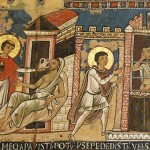We run our website the way we wished the whole internet worked: we provide high quality original content with no ads. We are funded solely by your direct support. Please consider supporting this project.

Q&A: Already-Not-Yet
Question: My question is regarding our “entanglement” with Christ that you spoke about a few weeks ago. In the sermon you noted how we are joined with Christ like those two particles that can be separated by light years of distance and yet both will react equally to a force acting on the other one. So here is my question: If I am entangled with Christ who is never affected/influenced by sin, temptation etc…, how and why do those things affect/influence me?
Answer: As I mentioned in my sermon, the New Testament teaches that we are in a curious stage of history in which all that is true about us and the world because of Christ is not yet manifested as true. This is what scholars sometimes refer to as “the already-not-yet” tension of the NT. So, as Hebrews 2 teaches, for example, all things are already ‘put under our feet,” but we do not yet see all things put under our feet (Heb. 2:7-8).
Here’s an analogy. When you turn on a light, it looks to you like the room is instantly made bright. Yet, if you were (say) a sub-atomic particle called a muon which travels close to the speed of light and exists for only a fraction of a second, it would take half a lifetime or more for that room to be filled with light. So too, from God’s perspective, the gap between what Christ accomplished when he died and rose again is almost non-existent, though from our perspective it has already taken 2,000 years and may, for all we know, take another 20,000 years before the cosmos reflects the truth of all Christ accomplished. Like Scripture says (2 Pet. 3), a day with the Lord is like a 1,000 years for us.
The same is true of us. We’re sort of a microcosm of the cosmos. It is true that we are entangled with Christ, but we don’t yet see this truth perfectly manifested in our life. Our task, however, is to yield to the Spirit and manifest as much of this truth now as we possibly can. We are to be the “already” in the midst of the “not yet”. We’re to put on display, as much as possible, what heaven will look like when it finally comes. And we do this by first envisioning ourselves as we truly are, taking every thought captive to Christ (2 Cor. 10:5) and by then living our lives in accordance with who we truly are, as much as possible.
That is faith: envisioning the truth about ourselves and every other person we see as a “substantial reality” (Heb. 11:1), and then stepping into that vision by how we conduct ourselves in our day-to-day lives.
Category: General
Tags: Identity in Christ, Kingdom Living, Quantum Physics
Related Reading

The Wrong “Bulls-Eye”: Reflections on the “Christian Left”
As it has since the fourth century, the Church today for the most part operates with a Constantinian (“power-over”) paradigm. Because of this, most socially concerned Christians are inclined to define the Church’s mission as adjudicating between and tweaking political options “in Jesus’ name.” We accept Caesar’s definition of “power” as the ability to get…

The Cosmic Scope of Spiritual Warfare
Yesterday’s post briefly introduced the reality that we live in the midst of spiritual warfare. This is the reality of being a part of creation where Satan prowls like a roaring lion (1 Pet 5:8-9). The Scriptures make it clear that all of creation is in need of redemption. While most Christians assume that the…

The One True Source
In the weeks to come, I’d like to share some thoughts on each of the nine convictions (expressed in A ReKnew Manifesto) that ReKnew seeks to promote. The ReKnew team is convinced that this “Manifesto” articulates aspects of the Kingdom that were largely neglected or misconstrued in traditional Christianity, but that will characterize the new Kingdom…

The Call to a Cruciform Life
Jesus repeatedly taught that following him meant that one had to be willing to “pick up their cross daily and follow [him]” (Lk 9:23; 14:27). Picking up our cross is the centerpiece of following Jesus because this was the centerpiece of what Jesus was all about. The thematic centrality of the cross is also illustrated…

The Image of Cross-Like Love: God’s Self-Portrait, Part 6
In the previous blog I argued that God is cross-like love. In this blog I’d like to take this a step further by demonstrating why the cross alone could function as the definitive revelation of God’s true character and by showing how this revelation weaves together everything Jesus was about. If you want to know…

Beautiful Ruins
H. Raab via Compfight If you want to read something today that is beautiful and challenging and unsettling, read this. D. L. Mayfield moved a couple of years ago with her husband and daughter from Portland to a diverse immigrant community in Minneapolis. They live a life of solidarity with the marginalized and oppressed. If you’re curious…
